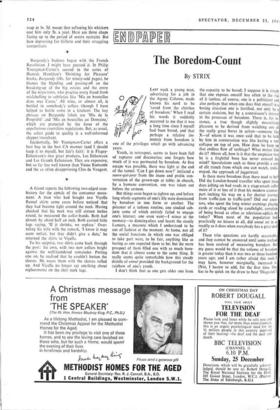The Boredom-Count
D.
PIM
By STRIX
Youth, in retrospect, seems to have been full of raptures and discoveries; one forgets how much of it was permeated by boredom. At first escape was possible, there was light at the end of the tunnel. 'Can I get down now?' initiated a sauve-qui-peut from the inane and prolix con- versation of the grown-ups at table; in church, by a humane convention, one was taken out before the sermon.
But things soon began to tighten up, and before long whole segments of one's life were dominated by boredom in one form or another. The prisoner of a tedious routine, one studied sub- jects some of which entirely failed to engage one's interest; one even went—I wince at the memory—to dancing-class and learnt the stately Lancers, a measure which I understand to be out of fashion at the moment. At home, not all the social functions in which one was obliged to take part were, to be fair, anything like as boring as one expected them to be; but the mere prospect of them filled one with so much bore- dom that it almost came to the same thing. It really seems quite remarkable how this steady drizzle of ennui provided the background for the rainbow of one's youth.
I don't think that as one gets older one loses the capacity to be bored; I suppose it is simply that one exposes oneself less often to the risk of it (unless, of course, one is a politician) and also perhaps that when one does find oneself in a boring situation one is fortified, not only by a certain stoicism, but by a connoisseur's interest in the processes of boredom. There is, for in- stance, a true though slightly masochistic pleasure to be derived from watching one of the really great bores in action—someone like X—of whom it was once said that to be held by him in conversation was like having a tent collapse on top of you. How does he keep up that endless flow of verbiage? What makes him do it? Above all, how is it that the suspicion that he is a frightful bore bas never crossed his mind? Speculations such as these provide a sort of slit trench from which one can watch, undis- mayed, the approach of juggernaut.
Is there more boredom than there used to be? Did the London-bound traveller who spent three days jolting on bad roads in a stage-coach suffer more of it or less of it than his modern counter- part inching his way on a far shorter journey from traffic-jam to traffic-jam? Did our ances- tors, who spent the long winter evenings playing cards or reading aloud by candlelight, complain of being bored as often as television-addicts do today? When most of the population had practically no leisure at all, did ennui set in as readily as it does when everybody has a great deal of it?
These trite questions are hardly seasonable, and they cannot be answered until some method has been evolved of measuring boredom. But my guess would be that the volume of boredom is greater today than it was two or three hundred years ago; and I am rather afraid this week'
i
may have, however marginally, increased it. (Not, I hasten to add, for the first time. One has to be quick on the draw to beat 'Disgusted!)






























 Previous page
Previous page